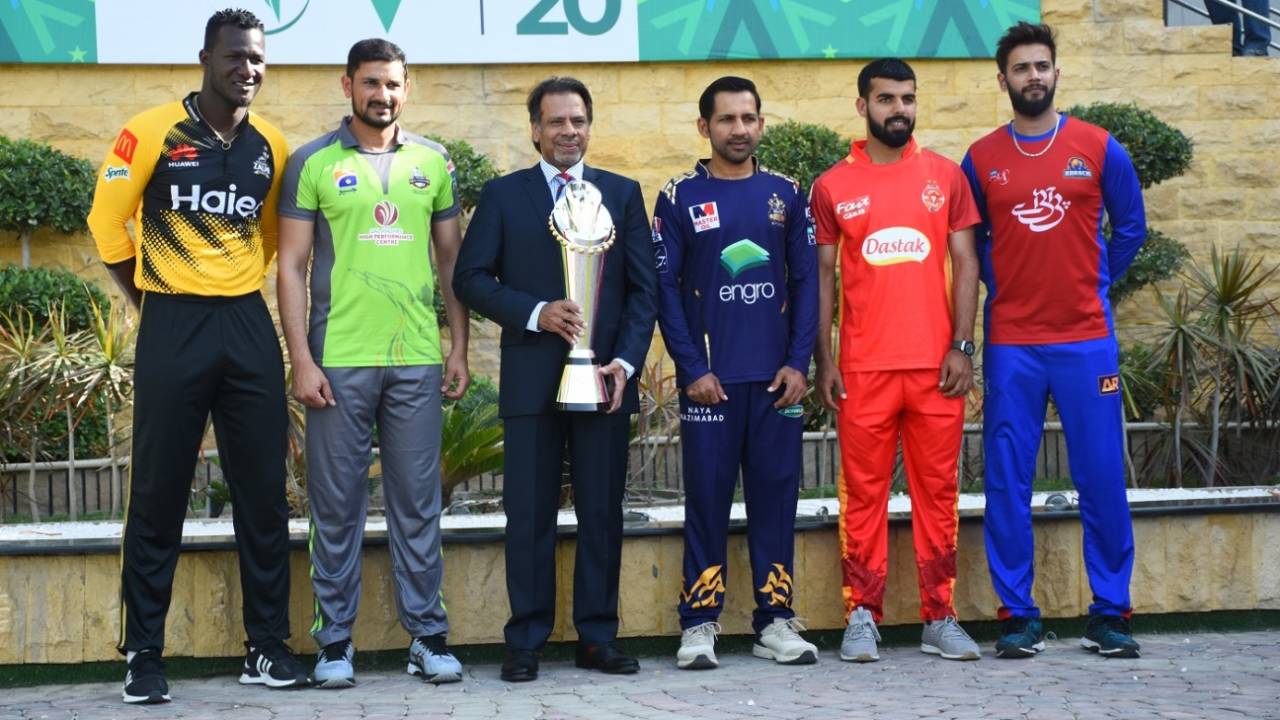Who is Sohail Akhtar, the new Lahore Qalandars captain?
The story of a player who was very nearly lost to Pakistan cricket, only to make a stirring comeback
Umar Farooq
Feb 21, 2020, 1:25 PM
Darren Sammy, Sohail Akhtar, Sarfaraz Ahmed, Shadab Khan and Imad Wasim pose with the PSL trophy • Associated Press
Here is the story of Sohail Akhtar, a player who very nearly fell through the cracks in the Pakistan cricket system, only to re-emerge as the captain of a PSL franchise.
Where did he come from?
Akhtar was born in Haripur, a district in the Hazara divison of Khyber Pukhtunkhwa, in the northern part of Pakistan. But he isn't a Pakhtoon, as most locals there are. He speaks Hindko and grew up around the Khanpur Dam and Wah Cantonment area, an hour's drive from Islamabad.
The most popular cricketer from this region was Arshad ur Rehman (popularly known as Arshad chacha), but he had to settle for playing in grade two for all of his 20-year career. Akhtar, too, could have been lost in the same way. He was in his early 20s when he picked up hard-ball cricket, but with lack of opportunities, he had been stuck playing district-level tournaments until Lahore Qalandars discovered him at age 30.
How did he get into competitive cricket?
Akhtar was 24 when he made his debut for Haripur in the PCB's inter-district senior tournament. That was in 2010. He marked the occasion with an explosive hundred, an early sign that he would end up as his team's leading run-getter - 307 runs in five games at 51.17. On that form, he might have expected a ticket to the 2011 Quaid-e-Azam Trophy with Abbottabad, but it never happened. And then the runs dried up. He did get a shot at first-class cricket, though, but perhaps after he was past his prime.
Why did it take so long for him to make the grade?
Akhtar was a victim of inter-district politics. While every district had due representation at the top level in the domestic circuit, players from the ones with stronger lobbies found it easier to break through. As a result, his senior career was restricted to 12 just first-class matches, between 2013 and 2017.
With Abbottabad Falcons relegated from the Quaid-e-Azam Trophy after finishing bottom in 2014, Akhtar returned to playing in grade two for a private confectionary maker, Candyland, and also for his home district. Finally, after playing for the Federally Administered Tribal Areas (FATA) team in 2017, he gave up on his first-class dreams and took up a clerk's job in Pakistan's atomic energy department.
What made him come back?
Well, T20 cricket. He chose to stay active in the shortest format and has been especially productive over the last three years. Between 2017 and 2018, he scored 303 runs for FATA at 33.66 with a strike rate of 126.25. It was around this time that the Qalandars' player development programme was gaining recognition and PCB coach Ayyaz Akbar Yousafzi recommended his name to Aaqib Javed.
Akhtar didn't make much headway on his first try - actually he wasn't even given one, largely because he was seen as overweight - but then Fakhar Zaman requested the Qalandars management to reconsider and at least let him play in the trials. Once there, Akhtar put on such a show that he eclipsed Umar Akmal with his big-hitting and was soon admitted into the Qalandars' ranks.
Okay, but how did he become their captain?
Qalandars have long struggled to make a mark in the PSL, never getting past the group stage and often finishing last. In their search for new leaders, they turned to one of their more solid performers, Akhtar, who had taken to the role of middle-order power-hitter quite well over the last two seasons, scoring 556 runs at a solid average of 37.06 and a healthy strike rate. Under his captaincy, the team won the 2018 Abu Dhabi T20 trophy.
While one random title win does not herald a new era, the manner in which Akhtar achieved it impressed the Qalandars staff. His hundred in the opening game was a watershed moment. Watching him steer a chase of 184 against Yorkshire gave the management all the confidence they needed to put him in charge for the upcoming PSL season. It helped, as well, that Akhtar emerged as the Qalandars' highest run-getter in the Abu Dhabi competition, suggesting that he enjoyed the extra responsibility.
Umar Farooq is ESPNcricinfo's Pakistan correspondent
